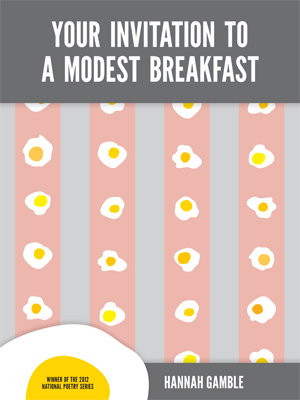 Your Invitation to a Modest Breakfast
Your Invitation to a Modest Breakfast
There is a grotesque, alien image we have all become too familiar with in film: potential lovers caught close together in the frame, face to face, in each other’s air, passionately doing anything but kissing. While the filmmakers tease the audience with the potential of these focused faces to collapse, chewing against each other, instead whole scenes play out with two people forcibly talking, yelling, or singing directly into each other’s wet, open mouth. Never mind how inhuman or unsanitary this practice would be if realized, from a critical remove, it utterly rejects the romantic imagery it intends to represent. If shown in the wrong light for too long, passion becomes a slobbering madness and sex a matter of leaking hydraulics. The great strength of Hannah Gamble’s poetry is its ability to call attention to the subtle horrors of human interaction, both real and artificially clichéd.
The titular poem in Your Invitation to a Modest Breakfast, a 2012 National Poetry Series selection, in fact, ends by balancing the low banality of a morning between a familiar couple “crouch[ed] on the tiles, two yellow dogs / drinking coffee from bowls” and letting breakfast burn against the grim cramped doorway love scenes where a man “walks over to the woman and says ‘Open your mouth.’” The cliché becomes gross, predatory, and assaulting. At the same time, this comparison grants the dull particulars of familiarity and routine a comforting warmth.
In “I am Told a Thing or Two about the Duende”—which refers to a state of heightened emotion as well as to a mythical goblin which leads girls astray—depicts the artistic muse as terrible and seductive, “clamp[ing] his mouth over your own, sending his thick / cello-voice into your lungs.” This forceful molestation echoes through the poem, where mouths and lungs inspire and expire on rot, decay, and desire. Lips are bitten and “bones broken in the midst of doing something wonderful.” Beauty and horror pass in and out of straining mouths, mingling in time. Each stanza of this prose poem mimics the effect of the poem as a whole: opening with a dramatic, painterly image charged with sorrow, glory, and other grand emotions which reach beyond human limitations. “The gypsy plays best when the ashes from his first wife’s clothes / blow into creaking folds of his accordion,” begins the second stanza. It is an image fraught with the sort of hyper-dramatic emotionality that we insist on calling “romantic.” Taken as a metaphor, it matches the clichés of singular devotion associated with musicians, artists, and poets which may culminate in cut wrists or severed ears, if not just pithy tattoos. Instead, Gamble’s gypsy accordionist—no matter how many wives he’s had since his burned first—is, in fact, shown to be choking out his song because “[h]is smoke-wife fills his lungs.” It isn’t sacrifice and ritual, after all, that artistic love engages, but cancer and “rotting teeth.” This poem introduces the collection’s continuing argument that representations of love are poisoned by romance.
This turning of romantic images toward the light is the leitmotif of Your Invitation to a Modest Breakfast. “For I Will Consider My Houseplant Magda” starts by redefining the titular plant as a beautiful woman, then begins introducing sour, moralistic notes in a logical tumble, couplet by couplet: “For if Magda glowed with roses / she would never be free of her lovers… // For no human can resist / a bud lit up by sunlight,” and so on. Ultimately, after introducing the strangely discomforting “smell of milk,” to the equation, the speaker rages against the lusty, willful plant which rejects her judgment of “her leaves and personality.” “For Magda often exalts the sun with her body / and I rush to close the shutter with my dirty hand.” In this poem, the simple act of anthropomorphic romanticism spoils and stains both the objectified and the objectifier.
The use of milk—itself a simple, bodily excretion which we can’t help but force grander text into—to disgust is repeated in a later poem, “Leisure, Hannah, Does Not Agree with You (2),” where the speaker bookends her attempts at radical self-improvement with two bold statements: “My body disgusted me, so I carved myself out of it” and “I walked out into the yard, / trying to vomit and drink milk simultaneously.” The first captures the careless grand drama of self-destruction while the latter captures the unflattering, minute details of it. This disturbing churn of food into, and out of, mouths is even bolder in the first part of “Leisure, Hannah…” where she represents herself with a “[m]outh stuffed with garlic cloves / testicular in shape and pungency.” This shocking image of the speaker’s self-effacement is quickly compared to that of “any little girl with gaps in her teeth clapping “Cake! / Oh, cake! It is so worth a soiled dress!” Even the specifics of our self-hatred take on mocking odors and textures as they slop out of the dumb caves of our horrid mouths.
Other poems find new ways to shoot down grand gestures. “In a Time of War” deals with masculinity and emasculation and twists time so that the male speaker is at once listening to his wife explain penises to their daughter, who sobs in horror at the idea, and trying not to wake the daughter while he copulates with his wife in the next room, silently chanting, “[a] son, a son, a son.” What echoes through the poem is the wife’s flippant, mocking tone while explaining that it isn’t the “tiny penis” that causes the grackle on the roof to make such noises. When the couple is caught in the act, the wife laughs off her still entangled husband in the same tones. “By Himself on a Sunday” gets to this point faster by mirroring the endorphin rush of a man post-masturbation to the lonely life of the single girl he fantasizes: the earthy smell of her boots and the wan comfort she finds in cupping “her own breast as she sleeps.” Nothing may mock the act of male masturbation more than actually romanticizing it and pretending that the man took the time to so completely set the sexless scene. In this feminine fantasy of a male fantasy, the man even plots where he is while she is stripping alone (rowing a boat out to a bell tower, of course).
Unfortunately, that which is strongest in Hannah Gamble’s work is also the source of its weakness. Her courting of romantic clichés at the same time as she undercuts them occasionally leads to the drier side of irony, which doesn’t tonally fit into many of these poems. The fake inspirational uplift of “We Can Walk Towards the Future as Towards a Luminous City” is too self-aware and too droll, encouraging the women reading it to “[w]atch documentaries / about exceptional children, / and eat some animal protein” and “[i]nstead of lying, / just tell him / something else.” Otherwise rich, nuanced poems overplay their hands. At times, the sarcastic tone struck is too easy and too pointed. The Kafka character referenced at the end of “I Have a Right to My Preferences” isn’t just avoiding returning home, it is “his wife's face, / to which he was indifferent” that he is avoiding. This overly plain turn of phrase slathers on the sarcasm to the sacrifice of subtlety.
The end result of these tonal missteps is that Your Invitation to a Modest Breakfast is a stronger, bolder, and more consistent collection on its second reading than it is at the beginning of the first. Once Hannah Gamble’s purpose is made clear, the variety of tools she can bring to bear, and the reach she has with them, is impressive. Gamble delves deep into romantic cliché to reveal how truly alien these familiar, comforting symbols are to human emotionality in the raw.

Anthony Rintala, poet and master eclectrician, spent many years on the hard streets of the American South. He did not live there, he just spent his youth walking down them toward the library or any of a series of comic book spinner racks. The streets weren't all that hard, after all; the asphalt went gooey after the sun shocked and cracked the surface like a crème brûlée. Rintala walked alongside these gooey streets of the American South, reading something, complaining, and thinking about snazzy desserts. That’s how he became a poet.